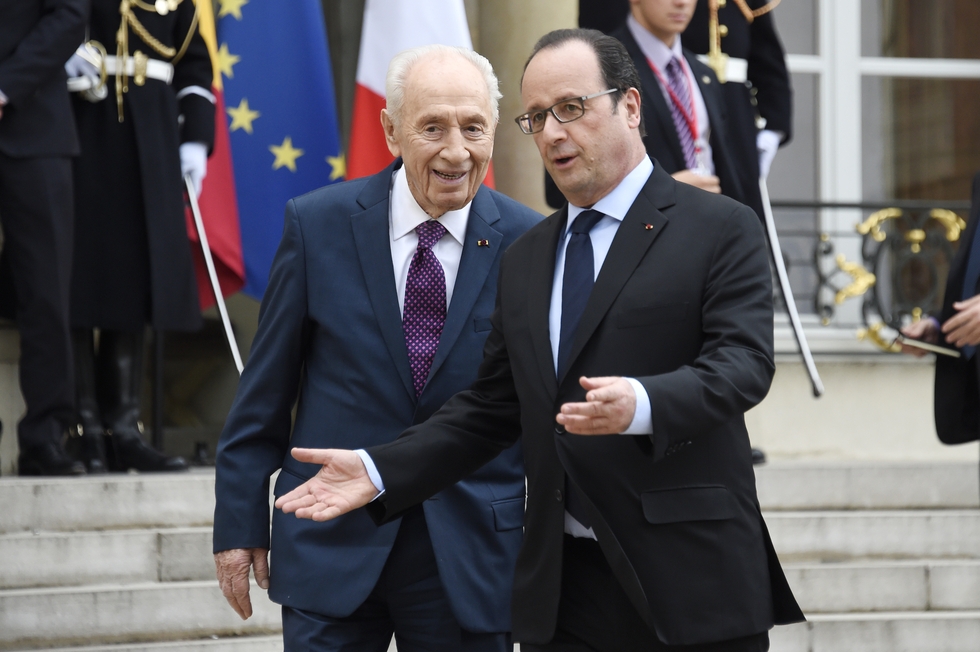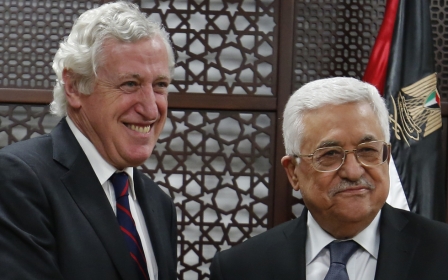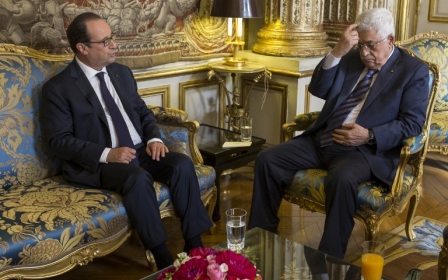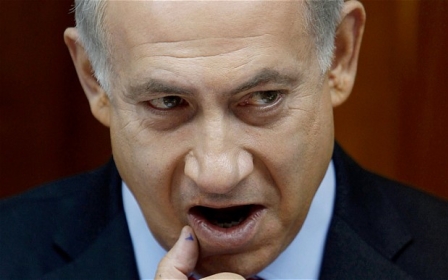ANALYSIS: French peace plan plays to home and international crowds

It was a bolt from the blue: a French push to revive Israeli-Palestinian talks, the promise of a new process without the baggage of American failures, and a possible way out of months of violence that has killed hundreds in the Occupied Territories and Israel.
It began with a plan by French President Francois Hollande for a new international peace conference this spring, followed by direct talks between Palestinian and Israeli negotiators in the summer, leading to a new confidence and measures that could end the suffering on all sides.
Yet this much-vaunted attempt to renew talks, almost two years after the US-led "road map" initiative hit the skids, already faces the same initial problems: no agreement to talks by either side, disagreement on what form any talks would take, and no deadline to push the process forward towards its goal.
Nevertheless, the past 10 days have seen a flurry of meetings between French, Israeli and Arab diplomats. The French foreign minister, Jean-Marc Ayrault, met Arab League counterparts in Egypt earlier this month, resulting in the league endorsing the French initiative on condition there would be a binding timetable for results.
A week later, the Israeli Prime Minister Benjamin Netanyahu spoke to Hollande by telephone about the deal.
France’s special envoy Pierre Vimont then met Dore Gold, the director general of Israel’s foreign ministry, and chief negotiator Isaac Molho before sitting down with Palestinian President Mahmoud Abbas, his Foreign Minister Riad al-Malki and chief negotiator Saeb Erekat.
It was, French diplomats said, a first step towards to defusing the “powder keg” threatening to explode as Palestinians continue knife and gun attacks on Israelis in the West Bank and beyond. “The status quo cannot last,” said Ayrault.
Yet the specifics remain unclear, and the French plan is in its infancy. A European diplomat in Jerusalem told Middle East Eye that French visits to Israel were a “test of the waters" for both parties. Another source close to the French initiative said the main goal was to “listen and reassure” both sides.
Tough assignment
If it wishes to take on the job, there is much for France to do.
Several initiatives have been launched over the past few years, including last September when the Quartet, a group of international entities, worked on its own "road map" to implement former agreements. It was followed by further meetings with regional partners, but there was no statement later on progress made.
At the UN, resolutions have been in the pipeline for more than four years. Most recently in October, temporary Security Council member New Zealand drafted a resolution calling on Israel to freeze West Bank settlement construction and home demolitions, and urged Palestinians to desist from taking steps against Israel at the International Criminal Court (ICC). The resolution is on hold.
Palestinians are seeking legitimacy at the ICC to allow it to charge Israel with war crimes during the 2014 Gaza war, as well as to call for investigations on settlements in the occupied West Bank.
In Europe, German Chancellor Angela Merkel stood alongside Netanyahu in February to state that “now is perhaps not the time for major steps,” leaving the French isolated.
Added to this apparent lack of international desire to push forward is opposition from both sides to even begin talks.
Gold, the Israeli foreign ministry director, questioned the “logic” behind the French initiative.
Israeli diplomats do not want international involvement in the peace process. Netanyahu reiterated that “peace cannot be imposed from outside”.
Ofer Zalzberg, a Jerusalem-based analyst at the Middle East Programme of the International Crisis Group, said: "We have repeatedly seen Israeli governments using negotiations as a tool to manage the conflict, not only to resolve it."
Thanks, but no thanks
Although the Israelis said they would “study” the French offer, it does not seem they are willing to get involved. After the French envoy visit, a European source based in Israel told MEE that Israeli diplomats were critical of the French initiative. “It’s not the framework they have in mind,” the source said.
Palestinians, enthusiastic at first, have changed their position. After meeting the French envoy, chief negotiator Erekat stated “there is no initiative yet,” adding that he awaited a more detailed plan and wanted a binding commitment.
Yaron Ezrahi, a political science professor at Jerusalem’s Hebrew University, told MEE: “Without a deadline, there is no initiative. Not setting a deadline is like cancelling the French dynamic, and it is a disappointment that Jean-Marc Ayrault is not committing to a deadline.”
Palestinians, unlike the Israelis, want international partners in any future process. A former Palestinian negotiator told MEE that this was key in President Abbas’ strategy.
“Abbas seeks international support so that the terms will be in line with international laws,” he said. “But Israel has no reason to accept it, since it would de facto condemn many of their policies toward the Palestinians.”
But even with so many disagreements to negotiate before any talks can happen, commentators believe it could be the beginning of a new phase in diplomacy.
Abbas has referred many times over the past few weeks to the “success of the Iran nuclear deal” - which was signed after the EU, the US and Iran came together - and seems to be hoping for a similar outcome in the Israeli-Palestinian conflict.
Daniel Levy, a former Israeli negotiator and now head of the Middle East and North Africa programme at the European Council on Foreign Relations, told MEE: “One potential advantage of the French approach would be that one could move beyond American exclusive management of peace efforts, with the French and others playing a greater role and being less hamstrung than the Americans.”
French ambition
Another side to this push, commentators say, is a French attempt to play a larger role in the Middle East as the US attempts to untangle itself from the poisoned role of "international policeman".
A week before Vimont’s visit, US Vice President Joe Biden was in Jerusalem, Tel Aviv and Ramallah. But he had nothing new to offer on peace talks, mirroring the apparent skepticism of President Barack Obama of the chance of resolution before he leaves the White House next January.
“There are two schools of thought,” said Dr Mahdi Abdul Hadi, who heads the think-tank Palestinian Academic Society for the Study of International Affairs (PASSIA). “Either the French will replace the Americans as mediators, or the French initiative is part of a shared Western agenda, and it is a division of labour between the Europeans and the Americans.”
Hadi said there was also a domestic dimension to France's sudden interest.
“The French want to convey a message to their French constituency that they follow what is happening in the Middle East, specifically after the Paris attacks."
Zalzburg agreed: “For France, it is primarily about domestic politics. There are significant Jewish and Muslim communities in France that are affected by the tensions between Israel and the Palestinians."
When asked if that would be a legitimate reason to lead a peace initiative between Israel and Palestine, a former Palestinian negotiator answered: "Well, whatever it takes."
New MEE newsletter: Jerusalem Dispatch
Sign up to get the latest insights and analysis on Israel-Palestine, alongside Turkey Unpacked and other MEE newsletters
Middle East Eye delivers independent and unrivalled coverage and analysis of the Middle East, North Africa and beyond. To learn more about republishing this content and the associated fees, please fill out this form. More about MEE can be found here.




